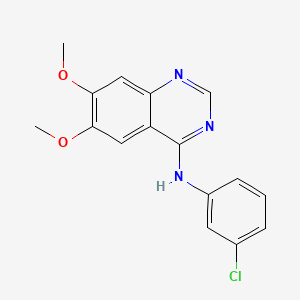m6A-centered Drug Response Information
General Information of the Drug (ID: M6APDG03327)
| Name |
AG1478
|
||||
|---|---|---|---|---|---|
| Synonyms |
AG-1478; 153436-53-4; Tyrphostin AG 1478; N-(3-chlorophenyl)-6,7-dimethoxyquinazolin-4-amine; 175178-82-2; Tyrphostin AG-1478; 4-(3-Chloroanilino)-6,7-dimethoxyquinazoline; AG 1478; AG1478; TYRPHOSTIN; 4-Quinazolinamine, N-(3-chlorophenyl)-6,7-dimethoxy-; UNII-SUH0SEZ9HY; SUH0SEZ9HY; AG-1478 hydrochloride; AG-1478 (Tyrphostin AG-1478); CHEMBL7917; CHEBI:75404; N-(3-Chlorophenyl)-6,7-dimethoxy-4-quinazolinamine; NSC-693255; AK-63142; N-(3-chlorophenyl)-6,7-dimethoxy-quinazolin-4-amine; BRD6408; BRD-6408; SR-01000076156; NSC693255
Click to Show/Hide
|
||||
| Status |
Preclinical
|
||||
| Structure |
 |
||||
| Formula |
C16H14ClN3O2
|
||||
| InChI |
1S/C16H14ClN3O2/c1-21-14-7-12-13(8-15(14)22-2)18-9-19-16(12)20-11-5-3-4-10(17)6-11/h3-9H,1-2H3,(H,18,19,20)
|
||||
| InChIKey |
GFNNBHLJANVSQV-UHFFFAOYSA-N
|
||||
| PubChem CID | |||||
| TTD Drug ID | |||||
| VARIDT Drug ID | |||||
Target Gene(s) and Their Upstream m6A Regulator, Together with the Effect of Target Gene(s) in Drug Response
The target genes involved in drug-target interaction (such as drug-metabolizing enzymes, drug transporters and therapeutic targets) and drug-mediated cell death signaling (including modulating DNA damage and repair capacity, escaping from drug-induced apoptosis, autophagy, cellular metabolic reprogramming, oncogenic bypass signaling, cell microenvironment, cell stemness, etc.) could be regulated by m6A regulator(s) and affected their corresponding drug response. You can browse detailed information on drug-related target gene(s) mediated by m6A regulators.
Breast cancer resistance protein (ABCG2)
Methyltransferase-like 3 (METTL3)
| In total 1 mechanisms lead to this potential drug response | ||||
| Response Summary | Breast cancer resistance protein (ABCG2) is a therapeutic target for AG1478. The Methyltransferase-like 3 (METTL3) has potential in affecting the response of AG1478 through regulating the expression of Breast cancer resistance protein (ABCG2). | [1], [2] | ||
Epidermal growth factor receptor (EGFR)
Methyltransferase-like 14 (METTL14)
| In total 1 mechanisms lead to this potential drug response | ||||
| Response Summary | Epidermal growth factor receptor (EGFR) is a therapeutic target for AG1478. The Methyltransferase-like 14 (METTL14) has potential in affecting the response of AG1478 through regulating the expression of Epidermal growth factor receptor (EGFR). | [3], [4] | ||
Methyltransferase-like 3 (METTL3)
| In total 1 mechanisms lead to this potential drug response | ||||
| Response Summary | Epidermal growth factor receptor (EGFR) is a therapeutic target for AG1478. The Methyltransferase-like 3 (METTL3) has potential in affecting the response of AG1478 through regulating the expression of Epidermal growth factor receptor (EGFR). | [4], [5] | ||
RNA demethylase ALKBH5 (ALKBH5)
| In total 1 mechanisms lead to this potential drug response | ||||
| Response Summary | Epidermal growth factor receptor (EGFR) is a therapeutic target for AG1478. The RNA demethylase ALKBH5 (ALKBH5) has potential in affecting the response of AG1478 through regulating the expression of Epidermal growth factor receptor (EGFR). | [4], [6] | ||
YTH domain-containing family protein 1 (YTHDF1)
| In total 1 mechanisms lead to this potential drug response | ||||
| Response Summary | Epidermal growth factor receptor (EGFR) is a therapeutic target for AG1478. The YTH domain-containing family protein 1 (YTHDF1) has potential in affecting the response of AG1478 through regulating the expression of Epidermal growth factor receptor (EGFR). | [4], [7] | ||
YTH domain-containing family protein 2 (YTHDF2)
| In total 1 mechanisms lead to this potential drug response | ||||
| Response Summary | Epidermal growth factor receptor (EGFR) is a therapeutic target for AG1478. The YTH domain-containing family protein 2 (YTHDF2) has potential in affecting the response of AG1478 through regulating the expression of Epidermal growth factor receptor (EGFR). | [4], [8] | ||
YTH domain-containing family protein 3 (YTHDF3)
| In total 1 mechanisms lead to this potential drug response | ||||
| Response Summary | Epidermal growth factor receptor (EGFR) is a therapeutic target for AG1478. The YTH domain-containing family protein 3 (YTHDF3) has potential in affecting the response of AG1478 through regulating the expression of Epidermal growth factor receptor (EGFR). | [4], [9] | ||
P-glycoprotein 1 (ABCB1)
Insulin-like growth factor 2 mRNA-binding protein 3 (IGF2BP3)
| In total 1 mechanisms lead to this potential drug response | ||||
| Response Summary | P-glycoprotein 1 (ABCB1) is a therapeutic target for AG1478. The Insulin-like growth factor 2 mRNA-binding protein 3 (IGF2BP3) has potential in affecting the response of AG1478 through regulating the expression of P-glycoprotein 1 (ABCB1). | [2], [10] | ||
Methyltransferase-like 3 (METTL3)
| In total 1 mechanisms lead to this potential drug response | ||||
| Response Summary | P-glycoprotein 1 (ABCB1) is a therapeutic target for AG1478. The Methyltransferase-like 3 (METTL3) has potential in affecting the response of AG1478 through regulating the expression of P-glycoprotein 1 (ABCB1). | [1], [2] | ||
Stress-activated protein kinase 2a (p38 alpha)
Insulin-like growth factor 2 mRNA-binding protein 2 (IGF2BP2)
| In total 1 mechanisms lead to this potential drug response | ||||
| Response Summary | Stress-activated protein kinase 2a (p38 alpha) is a therapeutic target for AG1478. The Insulin-like growth factor 2 mRNA-binding protein 2 (IGF2BP2) has potential in affecting the response of AG1478 through regulating the expression of Stress-activated protein kinase 2a (p38 alpha). | [11], [12] | ||
Methyltransferase-like 3 (METTL3)
| In total 1 mechanisms lead to this potential drug response | ||||
| Response Summary | Stress-activated protein kinase 2a (p38 alpha) is a therapeutic target for AG1478. The Methyltransferase-like 3 (METTL3) has potential in affecting the response of AG1478 through regulating the expression of Stress-activated protein kinase 2a (p38 alpha). | [12], [13] | ||
YTH domain-containing family protein 3 (YTHDF3)
| In total 1 mechanisms lead to this potential drug response | ||||
| Response Summary | Stress-activated protein kinase 2a (p38 alpha) is a therapeutic target for AG1478. The YTH domain-containing family protein 3 (YTHDF3) has potential in affecting the response of AG1478 through regulating the expression of Stress-activated protein kinase 2a (p38 alpha). | [11], [12] | ||
References